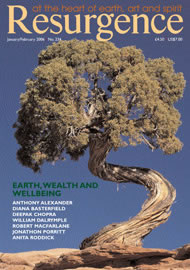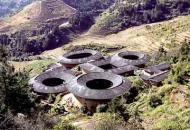IN AUGUST 2005 the Chinese government formally commissioned British design consultancy Arup to create Dongtan Eco-city, a new urban development for 100,000 people just outside Shanghai. Opening in 2010, it will be a showcase for low-impact modern development and will be the largest of a number of projects China is undertaking to engage with sustainability.
China's environment has suffered many problems over the last half-century. In the words of Jasper Becker, writing in the National Geographic, "With 1.3 billion people the implications of its gallop towards Western-style consumer society are sobering." These are not just problems for China, facing a giant public health crisis, but for the whole world. The implementation of Western modernity at a rate and scale a thousand times greater than in the Industrial Revolution means China alone may conclusively tip global ecosystems to breaking point.
Professor Sir Peter Hall, president of the UK's Town and Country Planning Association and one of the consultants for Dongtan, describes China as full of contradictions: "On the one hand there are very deep beliefs in the harmony of the universe, as seen in their historic temples and gardens. On the other hand, there is this nightmarish worship of modernity." Today the Chinese Government is becoming aware that the nation's 3,000-year heritage should be a source of national pride. What is less apparent is the significance of their civilisation once being governed by the world's most sophisticated philosophy regarding human interrelation with the natural world.
The belief system we call Daoism dates back to at least 500 BCE and promotes long life, peace and the veneration of nature through understanding the Dao, or the Way of the natural world. Achieving harmony with the Dao is sought by understanding how qi energy flows through everything according to the principles of yin (yielding) and yang (asserting), and how these principles dynamically balance and interact. How is this ancient school of thought and practice relevant today? Can Daoism tell us anything today about our role in the world, and can it help either China or the West address the environmental crisis of the modern industrial world?
Daoism defies simple categorisation by Western academic method, as central to its approach to knowledge is personal experiential practice, as seen in the Daoist arts of wu-shu, better known in the West as T'ai chi and kung fu. Daoist ('traditional Chinese') medicine, increasingly familiar in the West, comprising herbalism and acupuncture, is known for its effectiveness, even if its explanations are at odds with modern science. Feng shui, too, far from being a guide to arranging one's furniture, was originally the sophisticated Daoist art of urban planning that would ensure that settlements lay in harmony with the landscape and would not be at risk from flooding, soil erosion and other similar natural calamities.
AN ORTHODOX DAOIST priesthood has existed since the 1st century CE. The height of its influence on the state was between the 7th and 14th centuries, when Emperors led Daoist rituals from the temple complexes that still perch on top of China's sacred mountains. Besides being global leaders in medicine, agriculture and urban planning they were also technologists who created countless inventions that we now take for granted, from wrought iron to gunpowder, folding umbrellas to paddle boats. The Daoist notion of spiritual technology, however, went so far as to imbue religious value to tools that benefited physical and spiritual development.
Yet the Chinese were unable to achieve a European-style Industrial Revolution, precisely because they did not pursue an objective or abstract conception of the universe independent from human subjectivity. In Europe, this abstraction permitted the mathematical modelling of nature that led to modern science and the mechanistic paradigm. It was this 'failure' that led to Daoism being suppressed as feudal superstition by the Qing (Manchu) dynasty in the early 20th century. However, the increasing persecution that followed the arrival of Mao in the 1940s led to a Chinese diaspora that has seen Daoist practices take root in the West. Meanwhile, longstanding Chinese communities in Malaysia, Singapore, Hong Kong and Taiwan remained centres of Daoist culture.
Since the 1980s, under the auspices of the Chinese State Bureau of Religious Affairs there has been a revival of Daoism; the major sects of the Daoist priesthood have been steadily rebuilding their heritage, and the Chinese Daoist Association now includes some 45,000 priests and nuns in several thousand temples, monasteries and hermitages. They have been at the forefront of grassroots-level environmental work in China.
For nearly 2,000 years it has been the duty of Daoist priests to promote respect for nature and personal responsibility for the impact that one's actions have. Ordination rites once commanded priests to compel their congregations not to contaminate water, cut down trees unnecessarily or trap birds or animals. Universal peace was promoted not least because warfare involved a huge drain on natural resources, which often prompted further conflict.
The Daoist priesthood today encourages its millions of followers to cultivate new forest cover to repair denuded landscapes, to preserve wild habitats and to engage in social welfare and disaster relief. By directly working with their local communities, Daoists offer a practical bottom-up approach to counter the commendable, but poorly enforced, top-down environmental pronouncements from the central Government.
For Daoists, care for the Earth is religious duty as nature is sacred. Daoists pre-empt modern holistic scientists who know our atoms are born in the hearts of stars and our biology is inescapably linked to an interdependent ecosystem, as they see humanity as inseparable from Earth (nature) and Heaven (the sky and the universe). Their principal belief is that human intellect makes us uniquely capable of deviating from the natural order of the Dao for reasons of greed or ignorance; hence the need for Daoist teaching.
This profoundly practical insight makes Daoism greatly relevant today. At a fundamental level, Western thought seeks truth by what can be shown to be logically valid and is supported by experimental evidence. As such, it has a referential relationship with nature, founded on an idealised, abstract view that is external to the physical world it refers to. Daoist knowledge, by contrast, always perceives the natural world as something that can only be understood by experience, and as something that can be acted on only with due humility. Thus it has a 'deferential' view towards nature. The Chinese language itself does not give the same degree of certainty to words or names as Western languages do; hence specific reference is weaker and potential metaphorical association stronger. The Daoists' aesthetic approach to nature never escapes from the perspective of the individual, and the perception of nature is essentially an aspect of one's spiritual understanding.
ALTHOUGH DAOISTS PLAY an important and a growing role in modern China, on the surface they remain at the margins of society. The Daoist priesthood clearly sits in the role of a religious institution in a secular state, and it is concerned with preserving and practising an ancient tradition. Yet the broader philosophy of Daoism is so central a root of Chinese thought that it is as ubiquitous as, say, the Protestant work ethic is in the West; its deep influence is maintained despite the rise of secularism.
Paradox and contradiction are constructs of Western logic, and so the two intellectual and cultural ideologies of traditional Chinese metaphysics and industrial modernity remain in a strange but workable juxtaposition in modern China. Is a synthesis between the two possible? For China, a newly found respect for its heritage and an understanding of the role it played may open a new awareness of the natural world and an understanding of the consequence of human action that does not respect the power of the Dao. Daoism is finding a new role, and has wisely pronounced its compatibility with the socialist status quo by highlighting its role in promoting moral behaviour, altruism and personal responsibility. The focus on balance as a spiritual virtue means restraining from greed and wasteful (bourgeois) extravagance whilst promoting basic material welfare and reduction of poverty. Wealth is something that it is right to seek, but not if it creates disharmony. The Chinese government is currently looking at how it can interpret economic growth in a new way. The China Council for International Cooperation on Environment and Development is considering economic frameworks for clean, green growth. Whether Daoism will be considered in processes such as this or in projects such as Dongtan is hard to say.
But perhaps it is in the West that an appreciation of the Dao will bring the ripest fruit. This is primarily because Daoism is a philosophy of action that describes humanity as inescapably part of nature rather than in any way separate from it. The new paradigm of science, Gaia and systems theory, remains a referential framework within the edifice of modern rationalist inquiry. It does not speak of individual ethical action with the same weight of experience as the millennia-old wisdom of Daoism. What the new paradigm of science offers is rational explanation for a model of nature that Daoism has built up by experience rather than analysis. They can be thought of as different paths up the same mountain, the view from which represents understanding of the natural world.
Just as chaos theory shows that the universe can never be fully comprehended by human intellect, the Daoist classic Daode Jing begins by stating that the eternal Dao is beyond human definition. The Dao can be thought of as essentially describing the laws of science in action. The principles of yin and yang describe how systems behave, mirroring aspects of positive and negative feedback, where one amplifies and strengthens and the other weakens and dissipates.
Any Westerner learning Daoist arts aids the renaissance of a belief system that is radically different from that of the modern world. As China reopens to the outside world - for only the second time in the modern era - the West is encountering a civilisation built on profoundly different beliefs from those of the Semitic and Greek traditions. Today, China is looking to the West for advice on solving its environmental problems, from the Dongtan Eco-city to William McDonough's cradle-to-cradle sustainable village in Huangbaiyu.
If it is these projects that are scaled up to accommodate the 350 million people expected to move into urban developments in China over the next twenty-five years, and if sustainability can spread throughout urban China, then there is hope for a better future. Daoism shows that only by living in harmony with nature can humanity avoid misery. We must hope that an appreciation for the upper limits of acceptable human impact on the ecosystems on which our lives depend can be achieved and acted upon. Fortunately the philosophy of Daoism offers some hope that the latest understandings of environmental science can be balanced with an ancient environmental wisdom to offer a harmonious future for the East and the West. o








